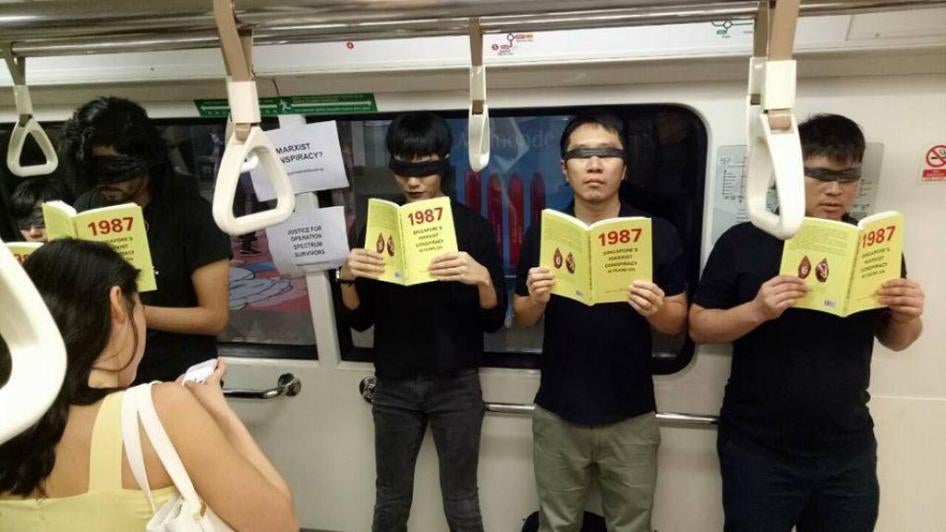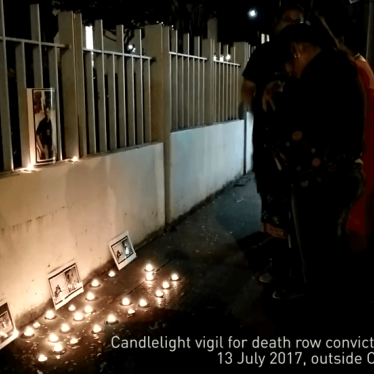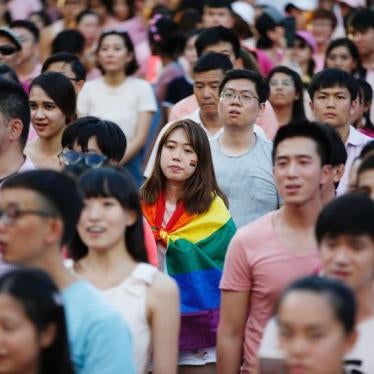(Bangkok) – Singapore authorities should drop the case against activist Jolovan Wham for holding three public gatherings in the city-state, Human Rights Watch said today. Authorities are expected to charge Wham on November 29, 2017 with three counts of organizing a public assembly without a police permit and one count of vandalism.
“Prosecuting Jolovan Wham for holding peaceful gatherings demonstrates the absurdity of Singapore’s laws on public assemblies and the government’s willingness to penalize those who speak out,” said Phil Robertson, deputy Asia director. “The Singapore government should start listening to criticism, stop treating peaceful assemblies as crimes, and cease prosecuting their organizers.”
Singapore’s draconian Public Order Act requires a police permit for any “cause-related” assembly that is held in a public place, or to which the public is invited. Organizing or participating in a protest without a permit is a criminal offense, even if the protest was peaceful and did not disrupt public order. The law covers not just outdoor gatherings, but also those held indoors if they are in a place open to the public, or if the public is invited.
The only exceptions are events held wholly inside a building or other enclosed premise where the organizers and all the speakers are citizens of Singapore and the event does not deal “with any matter which relates (directly or indirectly) to any religious belief or religion, or any matter which may cause feelings of enmity, hatred, ill-will, or hostility between different racial or religious groups in Singapore,” or events held at Speakers’ Corner, a designated section of Hong Lim Park.
Anyone found guilty of organizing a public assembly without a police permit can be fined up to S$5,000 (US$3,715), while repeat offenders can be fined up to S$10,000 (US$7,430) and jailed for up to six months.
The expected charges against Wham, 37, stem from three peaceful gatherings. The first, at an indoor venue on November 26, 2016, was a forum to discuss civil disobedience and social movements. Because Joshua Wong, who is not a citizen of Singapore, called into the forum from Hong Kong via Skype, Wham faces charges for violating the Public Order Act’s requirement to apply for and receive a police permit for an event featuring a foreign speaker.
Wham also faces charges for organizing a “silent protest” on June 3, 2017, without obtaining a police permit. The event, held to commemorate the thirtieth anniversary of the arrest and detention of 22 social activists and volunteers under the Internal Security Act in 1987, featured nine people who stood silently on board a Mass Rapid Transit (MRT) train, each blindfolded and holding up a book, “1987: Singapore’s Marxist Conspiracy 30 Years On.” The nine protesters then sat in empty seats in the train car and proceeded to read the book together. Authorities leveled the vandalism charge, which carries a penalty of up to three years in prison, against Wham because he temporarily pasted two sheets of paper calling for justice for the 1987 ISA detainees and opposing detention without trial to the inside of the train.
The final gathering was a candlelight vigil outside Changi Prison on July 13 to support the family of a Malaysian national, S. Prabagaran, who was slated to be executed for drug trafficking. Singapore authorities refused numerous entreaties from the family, lawyers, nongovernmental organizations, diplomatic missions, and the United Nations to stop the execution and commute the sentence to life in prison. Prabagaran was executed the following morning. Wham also faces charges for refusing to sign his statements to the police.
Under international law, freedom of assembly is a right and not a privilege and should not be subject to prior authorization by the authorities. It is widely accepted that no one should be subject to criminal penalties simply for organizing or participating in a peaceful assembly.
The Singapore Police Force, in a November 28 news release announcing that Wham would be charged, highlighted the fact that Singapore citizens can organize public assemblies without a permit “in accordance with the rules” at Speakers’ Corner. International standards provide that the government has an obligation to facilitate peaceful assemblies “within sight and sound” of their intended target. Restricting protests to a venue far from the target of the protests cannot be justified as a reasonable restriction on freedom of assembly, and the creation of Speakers’ Corner in no way justifies or balances the excessive restrictions on the right to freedom of assembly in the rest of the city-state.
“By charging Jolovan Wham with criminal offenses for these peaceful gatherings, the Singapore government is signaling its complete intolerance for even the mildest forms of public dissent,” Robertson said. “The case against him should be dropped, and urgent action taken to amend the Public Order Act to fully respect the right of all persons in Singapore to peacefully assemble.”









